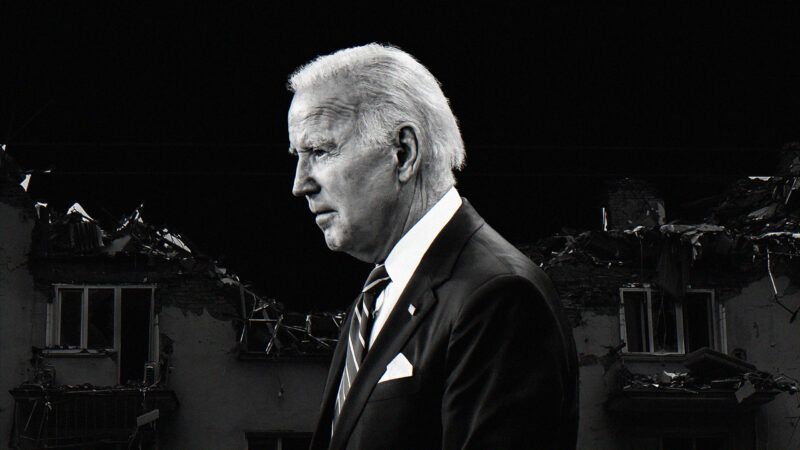America's Involvement in Ukraine Increasingly Looks Like War
Joe Biden announced an additional $800 million in weapons aid for Ukraine following last week's news that CIA personnel are directing intelligence in Kyiv.

President Joe Biden announced yesterday that the United States would send another $800 million in weapons aid to Ukraine, adding to the multibillion-dollar raft of assistance already sent to the country as it beats back the Russian invasion. The conflict recently entered its fourth month, and though U.S. government officials have been steadfast in asserting that America "will not be directly engaged" in the fight, that claim stands on shaky ground.
Last week, The New York Times cast a light on just how deeply entrenched the U.S. has become in the conflict in Ukraine, describing "a stealthy network of commandos and spies rushing to provide weapons, intelligence and training." Though the Biden administration has repeatedly stressed that it won't deploy American troops to Ukraine, the Times reports that "some C.I.A. personnel have continued to operate in the country secretly, mostly in the capital, Kyiv, directing much of the vast amounts of intelligence the United States is sharing with Ukrainian forces."
Much of what the Biden administration has done to help Ukraine has fallen short of formal involvement in the war, but just barely. American soldiers won't enter the fight, but American spies will. American officials have warned of the escalatory effects of enforcing a no-fly zone over Ukrainian territory, but American weapons are being funneled to Ukraine with regularity. The U.S. hasn't officially declared war against Russia, but it's helped kill Russian generals and sink the flagship of Russia's Black Sea fleet.
These moves have largely been unilateral, secretive, or both, leaving Americans unaware of just how implicated the U.S. is in the conflict. Government officials themselves lack insight into the effects of American assistance, telling The Wall Street Journal that they have "little direct knowledge" of where equipment goes once it reaches the Ukrainian government. And lawmakers have helped enable this lack of transparency by rubber-stamping massive aid packages, eschewing discussions of financial oversight, and failing to effectively challenge the president on the aims of American assistance.
As Biden announced the latest aid package, he swore that the U.S. would "support Ukraine as long as it takes." It might be a noble statement, but for a president who has rallied against "forever wars," it neglects several key realities. American involvement could very well become protracted if leaders don't establish a clear off-ramp. The sunk-cost fallacy being what it is, politicians may find ways to maintain involvement in the future as a way to justify the hefty financial investments they've already made in the fight. This approach runs the risk of simply helping the war lumber on rather than incentivizing the involved parties to engage in peace talks.
"At the very least, what the United States is doing in Ukraine is not not war," Bonnie Kristian, a fellow at Defense Priorities, wrote in The New York Times. "If we have so far avoided calling it war and can continue to do so, maybe that's only because we've become so uncertain of the meaning of the word."
Kristian correctly points out that "the line between what is war and what is not war has perilously blurred," as technological advances and executive war making have made it easier for presidents "to commit what might otherwise be seen as acts of war." Sporadic drone strikes against terror groups throughout the Middle East, "training" missions in hostile nations that go unauthorized by Congress, weapons and logistical support to Saudi Arabia as it wages a devastating war in Yemen—government officials often paint these as acts short of war, which distorts our understanding of the gravity of conflict.
At some point, Russia may come to view the U.S. as a co-belligerent. American politicians can't be certain of what Russian President Vladimir Putin sees as the uncrossable line. That's why it's so critical for lawmakers and their constituents to know the particulars of U.S. involvement in Ukraine and debate them robustly. Otherwise, America will trend ever closer toward war—even if politicians hesitate to call it that.
